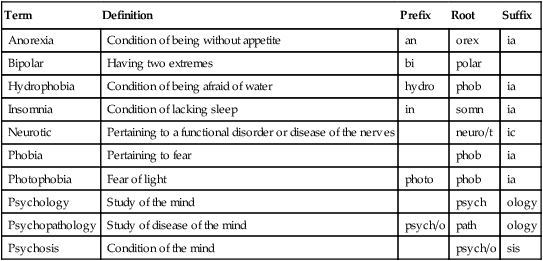Chapter 30 *A transition syllable or vowel may be added to or deleted from the word parts to make the combining form. The function of the mental health care team is to provide care and treatment for individuals with disorders of the mind, emotion, or behavior (Box 30-1). Mental health care workers must have an interest in behavior and the ability to communicate well. The work is challenging and requires the worker to be creative in finding unusual solutions to problems. Mental health care workers must be emotionally stable and mature. They must be able to lead and inspire others while demonstrating patience and perseverance. The field of mental health care is constantly growing (Table 30-1). With the increasing age of the population in general and the higher cost of care, many of the mental health care services have moved into the homes of the patients, residential facilities, and neighborhood clinics. Additionally, more allied and support staff personnel are providing care and treatments that were done by professionals in the past. TABLE 30-1 Mental Health Career Educational Cost and Earnings *http://www.mtsu.edu/bursar/rates_main.shtml. Psychologists are professionals who specialize in treatment of mental and emotional disorders. They study human behavior and mental processes to understand and explain human actions. Methods of treatment include personal interviews, intelligence and aptitude testing, and observation. Most psychologists earn a doctoral (PhD, EdD, or PsyD) degree and complete an internship before obtaining the licensure or certification required to practice independently. The doctor of psychology degree is offered by professional schools that emphasize training for clinical practice. Psychologists may specialize in the area of educational, social, clinical, cross-cultural, quantitative, consumer, environmental, developmental, rehabilitative, or organizational behavior (Box 30-2). More than 40% of psychologists are self-employed.
Mental Health Careers
 Define at least eight terms relating to mental health care.
Define at least eight terms relating to mental health care.
 Describe the function of the mental health care team.
Describe the function of the mental health care team.
 Specify the role of selected members of the mental health care team, including the personal qualities, levels of education, and credentialing requirements.
Specify the role of selected members of the mental health care team, including the personal qualities, levels of education, and credentialing requirements.
 Define mental health and mental hygiene.
Define mental health and mental hygiene.
 Describe at least four psychoneurotic disorders.
Describe at least four psychoneurotic disorders.
 Describe at least two types of psychosis.
Describe at least two types of psychosis.
 Describe procedures for use of physical restraint.
Describe procedures for use of physical restraint.
Term
Definition
Prefix
Root
Suffix
Anorexia
Condition of being without appetite
an
orex
ia
Bipolar
Having two extremes
bi
polar
Hydrophobia
Condition of being afraid of water
hydro
phob
ia
Insomnia
Condition of lacking sleep
in
somn
ia
Neurotic
Pertaining to a functional disorder or disease of the nerves
neuro/t
ic
Phobia
Pertaining to fear
phob
ia
Photophobia
Fear of light
photo
phob
ia
Psychology
Study of the mind
psych
ology
Psychopathology
Study of disease of the mind
psych/o
path
ology
Psychosis
Condition of the mind
psych/o
sis

Careers

Psychologist
Mental Health Careers
Get Clinical Tree app for offline access










































